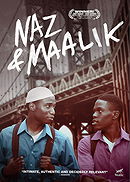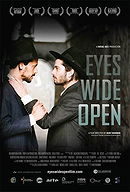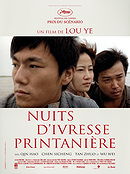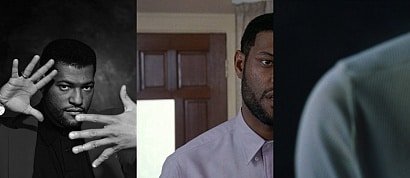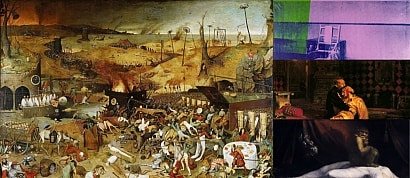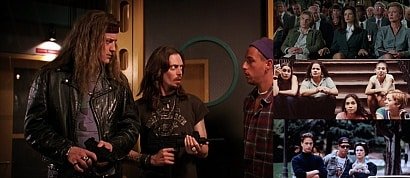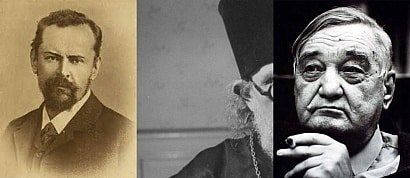Homosexuality in homophobic communities
Sort by:
Showing 8 items
Decade:
Rating:
List Type:
 Add items to section
Add items to section
Black Community
The homophobia is considered to be quite prevalent within the African American community. Numerous reasons are given for this, including: the image young black males are supposed to convey in the public sphere; the fact that homosexuality is often seen as antithetical to being black in the African American community; and the association of the African American community with the church in the United States. Barack Obama has acknowledged homophobia within the African American community, and made a statement to the community saying that: "If we are honest with ourselves, we'll acknowledge that our own community has not always been true to [Martin Luther] King's vision of a beloved community [...] We have scorned our gay brothers and sisters instead of embracing them."
Moonlight (2016)
A chronicle of the childhood, adolescence and burgeoning adulthood of a young, African-American, gay man growing up in the rough neighborhood of Miami.


Nusch 's rating:


 Add items to section
Add items to section
Muslim Community
The traditional schools of Islamic law based on Quranic verses and hadith, and influenced by Islamic scholars such as Imam Malik and Imam Shafi, consider homosexual acts a punishable crime and a sin.[3] The Qur'an cites the story of the "people of Lot" destroyed by the wrath of God because they engaged in lustful carnal acts between men.
Extreme prejudice remains, both socially and legally, in much of the Islamic world against people who engage in homosexual acts. In Afghanistan, Brunei, Gaza Strip, Iran, Iraq, Mauritania, Nigeria, Saudi Arabia, Sudan, United Arab Emirates and Yemen, homosexual activity carries the death penalty. In others, such as Algeria, Maldives, Malaysia, Pakistan, Qatar, Somalia and Syria, it is illegal. Same-sex sexual intercourse is legal in 20 Muslim-majority nations (Albania, Azerbaijan, Bahrain, Bosnia and Herzegovina, Burkina Faso, Chad, Djibouti, Guinea-Bissau, Lebanon, Tunisia, Jordan, Kazakhstan, Kosovo, Kyrgyzstan, Mali, Niger, Tajikistan, Turkey, West Bank (State of Palestine), and most of Indonesia (except in Aceh and South Sumatra provinces, where bylaws against LGBT rights have been passed), as well as Northern Cyprus. In Albania, Tunisia, Lebanon, and Turkey, there have been discussions about legalizing same-sex marriage. Homosexual relations between females are legal in Kuwait, Turkmenistan and Uzbekistan, but homosexual acts between males are illegal.
Extreme prejudice remains, both socially and legally, in much of the Islamic world against people who engage in homosexual acts. In Afghanistan, Brunei, Gaza Strip, Iran, Iraq, Mauritania, Nigeria, Saudi Arabia, Sudan, United Arab Emirates and Yemen, homosexual activity carries the death penalty. In others, such as Algeria, Maldives, Malaysia, Pakistan, Qatar, Somalia and Syria, it is illegal. Same-sex sexual intercourse is legal in 20 Muslim-majority nations (Albania, Azerbaijan, Bahrain, Bosnia and Herzegovina, Burkina Faso, Chad, Djibouti, Guinea-Bissau, Lebanon, Tunisia, Jordan, Kazakhstan, Kosovo, Kyrgyzstan, Mali, Niger, Tajikistan, Turkey, West Bank (State of Palestine), and most of Indonesia (except in Aceh and South Sumatra provinces, where bylaws against LGBT rights have been passed), as well as Northern Cyprus. In Albania, Tunisia, Lebanon, and Turkey, there have been discussions about legalizing same-sex marriage. Homosexual relations between females are legal in Kuwait, Turkmenistan and Uzbekistan, but homosexual acts between males are illegal.
Naz & Maalik (2015)
Two closeted Muslim teens hawk goods across Brooklyn and struggle to come clean about their sexuality, as their secretive behavior leads them unknowingly into the cross-hairs of the War on Terror.


 Add items to section
Add items to section
neo-Nazi Groups
Understanding West Germany's extraordinary persecution of gay men first requires revisiting exactly how homosexuals were treated under Nazi rule. When the party came to power in 1933, gay men were among the first victims targeted—Nazi brown-shirts closed gay bars, stormed Berlin's famed Institute for Sexology, and burned gay texts, effectively stamping out Weimar Germany's renowned gay community. Gay elements within the Party, including Ernst Röhm, the commander of its Sturmabteilung (SA) paramilitary force, were purged in the 1934 Night of Long Knives, opening the way for more homophobic policies championed by, among others, Schutzstaffel (SS) chief Heinrich Himmler.
On June 28, 1935, Hitler's government introduced a new, bleaker version of §175, which had previously prohibited only penetrative intercourse—something difficult to prove in court. Under the new Nazi statute, any act construed to be homosexual was criminalized—a wrong glance could land a man in prison. This looser definition caused convictions to skyrocket from a few hundred per year to over eight thousand. A horror-house of punishments awaited those found guilty, from heavy prison sentences to concentration camps and castration.
Between 1935 and 1943, around 46,000 men were convicted under the provision. Of those, between 5,000 and 15,000 were sent to concentration camps, where their clothing bore pink triangles, now a ubiquitous symbol of gay liberation. Fewer than half survived.
When the Allied Powers occupied Germany in 1945, they repealed particularly egregious Nazi laws, such as the infamous Nuremberg Laws that banned intercourse and marriage between Jews and those defined as Aryans. But the occupiers remained silent on the question of which version of §175 would stand—the harsher law passed in 1935, or the milder provision it had replaced. While East German courts quickly decided the 1935 version was an illegitimate Nazi law, West Germany continued to enforce it.
Brotherhood (2009)
Former Danish servicemen Lars and Jimmy are thrown together while training in a neo-Nazi group. Moving from hostility through to friendship and finally passion, events take a darker turn when it's discovered.


 Add items to section
Add items to section
Orthodox Jews Culture
The subject of homosexual behavior and Judaism dates back to the Torah. The book of Vayiqra (Leviticus) is traditionally regarded as classifying sexual intercourse between males as a to'eivah (something abhorred or detested) that can, very theoretically and not in practice (see discussion below on capital punishment in Jewish law) be subject to capital punishment by the currently nonexistent Sanhedrin under halakha (Jewish law).
Someone who has had homosexual intercourse is considered to have violated a prohibition.[citation needed] If he does teshuva (repentance)—i.e., he ceases his forbidden actions, regrets what he has done, apologizes to God, and makes a binding resolution never to repeat those actions, he is seen to be forgiven by God.
Someone who has had homosexual intercourse is considered to have violated a prohibition.[citation needed] If he does teshuva (repentance)—i.e., he ceases his forbidden actions, regrets what he has done, apologizes to God, and makes a binding resolution never to repeat those actions, he is seen to be forgiven by God.
Eyes Wide Open (2009)
A married, Orthodox, Jerusalem butcher and Jewish father of four falls in love with his handsome, 22-year-old male apprentice, triggering the suspicions of his wife and the disapproval of his Orthodox community.


 Add items to section
Add items to section
Communist China
Even as late as the early 1980s and 1990s, there were some Chinese men seeking asylum in other countries reported that they had faced systematic discrimination and harassment from the government because of their sexual orientation as well as similar mistreatment from family members. Likewise, the Chinese government did treat homosexuality as a disease and subjected gay men to electric shock therapy and other attempts to change their sexual orientation.
For a period of the modern history of both the Republic of China and People's Republic of China in the 20th century, LGBT people received more stringent legal regulations regarding their orientations, with restrictions being gradually eased by the beginning of the 21st century. However, activism for LGBT rights in both countries has been slow in development due to societal sentiment and government inaction. Before 2001 in China, homosexual behaviour was classed as mental illness by law.
For a period of the modern history of both the Republic of China and People's Republic of China in the 20th century, LGBT people received more stringent legal regulations regarding their orientations, with restrictions being gradually eased by the beginning of the 21st century. However, activism for LGBT rights in both countries has been slow in development due to societal sentiment and government inaction. Before 2001 in China, homosexual behaviour was classed as mental illness by law.
East Palace, West Palace (1996)
The film focuses on a young gay writer A-Lan who, being attracted to a young policeman, manages to have himself interrogated for a whole night. His life-story which he tells during the interrogation reflects the general repression of the Chinese society. The policeman's attitude shifts from the initial revulsion to fascination and, finally, to attraction.


Spring Fever (2009)
Hired to spy on a philandering husband, Luo Haitao soon becomes entangled in a clandestine affair with the other man. Along with Luo's girlfriend, they succumb to the delirium of drunken nights, but how long can their last tryst?


 Add items to section
Add items to section
Mormon Church
The law of chastity of The Church of Jesus Christ of Latter-day Saints (LDS Church) states that "sexual relations are proper only between a man and a woman who are legally and lawfully wedded as husband and wife." In principle, this commandment forbids all same-sex sexual behavior (whether intra-marriage or extramarital). Homosexuality-related violations of the law of chastity may result in church discipline.
Although the LDS Church has taught that homosexuality is a curable condition, it now states that "individuals do not choose to have such attractions" and that therapy focusing on "a change in sexual orientation" is "unethical". The church teaches that regardless of the cause of same sex attraction, "immoral relationships" must be abjured.
The LDS Church has campaigned against government recognition of same-sex marriage, and the issue of same-sex marriage has been one of the church's foremost political concerns since the 1990s.
Although the LDS Church has taught that homosexuality is a curable condition, it now states that "individuals do not choose to have such attractions" and that therapy focusing on "a change in sexual orientation" is "unethical". The church teaches that regardless of the cause of same sex attraction, "immoral relationships" must be abjured.
The LDS Church has campaigned against government recognition of same-sex marriage, and the issue of same-sex marriage has been one of the church's foremost political concerns since the 1990s.
Latter Days (2003)
Aaron Davis, a young Mormon, arrives in Los Angeles with three fellow missionaries to evangelize. The group's gay neighbor, Christian, makes a bet he can seduce with one of them, and his flirtatious ways help Aaron realize he is actually gay. Returning home to small-town Idaho in shame, Aaron is sent to a faith-based center to be cured of his homosexuality -- while Christian, who's fallen in love with him, desperately tries to find him.


 Add items to section
Add items to section
Latino community
Many Latinos experienced negative messages about their sexual orientation from their own communities. They reported that they had faced ostracism from their friends and peers, and felt "that they were not truly 'men'", according to the standards of some in their community.
A GHN news editor stated that homophobia in the Latino community is tied to a value system that finds it difficult to accept overt sexuality. It is also a part of rigid gender roles and machismo.
In the US, Latino/as who identify as LGBTQ face scrutiny not just from their community at home but within their community at school as well, especially within a high school or college preparation experience. While facing scrutiny by family and community to maintain gender normality in order to prosper in the US, they also must face scrutiny from their fellow peers, mentors and administration in the educational environment.
A GHN news editor stated that homophobia in the Latino community is tied to a value system that finds it difficult to accept overt sexuality. It is also a part of rigid gender roles and machismo.
In the US, Latino/as who identify as LGBTQ face scrutiny not just from their community at home but within their community at school as well, especially within a high school or college preparation experience. While facing scrutiny by family and community to maintain gender normality in order to prosper in the US, they also must face scrutiny from their fellow peers, mentors and administration in the educational environment.
People who voted for this also voted for
Hollywood's Next Wave by Vanity Fair
Film Diary of 2023
From Best to Worst: Vacation
Star Wars Movies: Ranked
My Favorite Actresses
TV Journal 2015-2016
British Comedy: Doctor in the House
The Evolution of Tony Goldwyn
Top 10 Movies I Like But Everyone Else Hates
most beautiful villages in France
From Best to Worst: 2009 Movies
UNDER THE SEA
From Best To Worst: James Bond
My Favorite Actors: Rachel McAdams
My Favorite Actors: Laurence Fishburne
More lists from Nusch
Non racist skinhead
Disturbing Pieces of Art
Sexiest On-Screen Couples
Cannibal Comedies
Movies That Are Way Too 90s
Movies With Plant and Gardening Themes
Neo-Eurasianism
 Login
Login
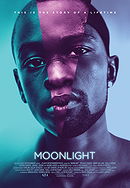
 658
658
 7.6
7.6
 7.4
7.4
